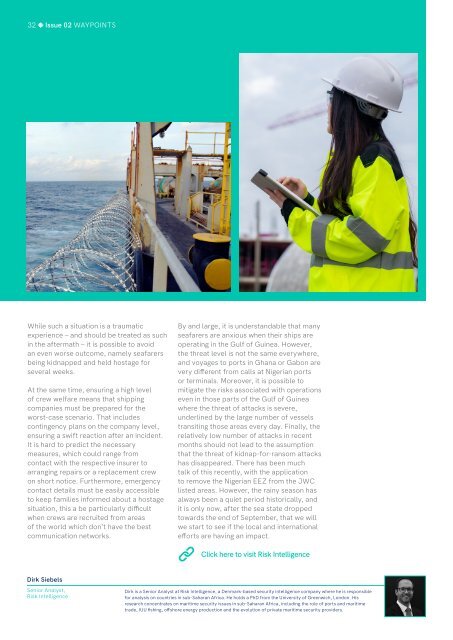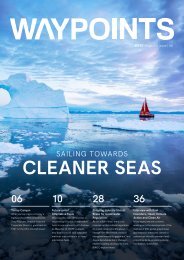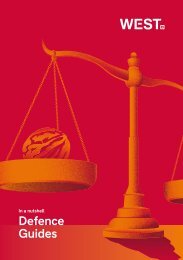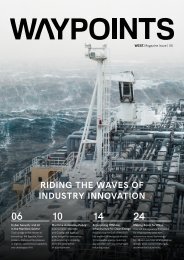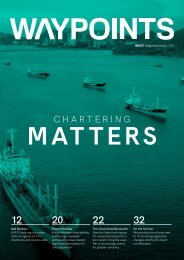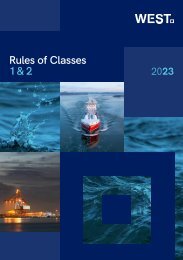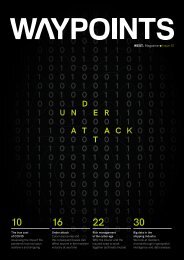Waypoints Issue 02: Wellness at Sea, Wellness on Shore
The second issue of Waypoints magazine takes the mental health of mariners as its focus. Our staff outline beneficial techniques for self-awareness and reflection, highlight compassionate crew welfare policies, look at amendments to the Maritime Labour Convention designed to protect seafarers abandoned by their employers, and emphasise the critical importance of the next steps. Also included are features on the International Group’s ongoing work to provide consistent cover for its stakeholders irrespective of global trading fluctuations, and the wisdom of implementing delay insurance. Our New York branch comes under the office profile spotlight, and we present another round-up of recent arbitrations.
The second issue of Waypoints magazine takes the mental health of mariners as its focus. Our staff outline beneficial techniques for self-awareness and reflection, highlight compassionate crew welfare policies, look at amendments to the Maritime Labour Convention designed to protect seafarers abandoned by their employers, and emphasise the critical importance of the next steps. Also included are features on the International Group’s ongoing work to provide consistent cover for its stakeholders irrespective of global trading fluctuations, and the wisdom of implementing delay insurance. Our New York branch comes under the office profile spotlight, and we present another round-up of recent arbitrations.
Create successful ePaper yourself
Turn your PDF publications into a flip-book with our unique Google optimized e-Paper software.
32<br />
<str<strong>on</strong>g>Issue</str<strong>on</strong>g> <str<strong>on</strong>g>02</str<strong>on</strong>g> WAYPOINTS<br />
A Maritime<br />
Risk Management<br />
C<strong>on</strong>sultancy<br />
Qwest meets ship owners’ and oper<str<strong>on</strong>g>at</str<strong>on</strong>g>ors’ existing<br />
and emerging needs through a range of innov<str<strong>on</strong>g>at</str<strong>on</strong>g>ive<br />
marine claims, legal, and investig<str<strong>on</strong>g>at</str<strong>on</strong>g>ive soluti<strong>on</strong>s.<br />
While such a situ<str<strong>on</strong>g>at</str<strong>on</strong>g>i<strong>on</strong> is a traum<str<strong>on</strong>g>at</str<strong>on</strong>g>ic<br />
experience – and should be tre<str<strong>on</strong>g>at</str<strong>on</strong>g>ed as such<br />
in the afterm<str<strong>on</strong>g>at</str<strong>on</strong>g>h – it is possible to avoid<br />
an even worse outcome, namely seafarers<br />
being kidnapped and held hostage for<br />
several weeks.<br />
At the same time, ensuring a high level<br />
of crew welfare means th<str<strong>on</strong>g>at</str<strong>on</strong>g> shipping<br />
companies must be prepared for the<br />
worst-case scenario. Th<str<strong>on</strong>g>at</str<strong>on</strong>g> includes<br />
c<strong>on</strong>tingency plans <strong>on</strong> the company level,<br />
ensuring a swift reacti<strong>on</strong> after an incident.<br />
It is hard to predict the necessary<br />
measures, which could range from<br />
c<strong>on</strong>tact with the respective insurer to<br />
arranging repairs or a replacement crew<br />
<strong>on</strong> short notice. Furthermore, emergency<br />
c<strong>on</strong>tact details must be easily accessible<br />
to keep families informed about a hostage<br />
situ<str<strong>on</strong>g>at</str<strong>on</strong>g>i<strong>on</strong>, this a be particularly difficult<br />
when crews are recruited from areas<br />
of the world which d<strong>on</strong>’t have the best<br />
communic<str<strong>on</strong>g>at</str<strong>on</strong>g>i<strong>on</strong> networks.<br />
By and large, it is understandable th<str<strong>on</strong>g>at</str<strong>on</strong>g> many<br />
seafarers are anxious when their ships are<br />
oper<str<strong>on</strong>g>at</str<strong>on</strong>g>ing in the Gulf of Guinea. However,<br />
the thre<str<strong>on</strong>g>at</str<strong>on</strong>g> level is not the same everywhere,<br />
and voyages to ports in Ghana or Gab<strong>on</strong> are<br />
very different from calls <str<strong>on</strong>g>at</str<strong>on</strong>g> Nigerian ports<br />
or terminals. Moreover, it is possible to<br />
mitig<str<strong>on</strong>g>at</str<strong>on</strong>g>e the risks associ<str<strong>on</strong>g>at</str<strong>on</strong>g>ed with oper<str<strong>on</strong>g>at</str<strong>on</strong>g>i<strong>on</strong>s<br />
even in those parts of the Gulf of Guinea<br />
where the thre<str<strong>on</strong>g>at</str<strong>on</strong>g> of <str<strong>on</strong>g>at</str<strong>on</strong>g>tacks is severe,<br />
underlined by the large number of vessels<br />
transiting those areas every day. Finally, the<br />
rel<str<strong>on</strong>g>at</str<strong>on</strong>g>ively low number of <str<strong>on</strong>g>at</str<strong>on</strong>g>tacks in recent<br />
m<strong>on</strong>ths should not lead to the assumpti<strong>on</strong><br />
th<str<strong>on</strong>g>at</str<strong>on</strong>g> the thre<str<strong>on</strong>g>at</str<strong>on</strong>g> of kidnap-for-ransom <str<strong>on</strong>g>at</str<strong>on</strong>g>tacks<br />
has disappeared. There has been much<br />
talk of this recently, with the applic<str<strong>on</strong>g>at</str<strong>on</strong>g>i<strong>on</strong><br />
to remove the Nigerian EEZ from the JWC<br />
listed areas. However, the rainy seas<strong>on</strong> has<br />
always been a quiet period historically, and<br />
it is <strong>on</strong>ly now, after the sea st<str<strong>on</strong>g>at</str<strong>on</strong>g>e dropped<br />
towards the end of September, th<str<strong>on</strong>g>at</str<strong>on</strong>g> we will<br />
we start to see if the local and intern<str<strong>on</strong>g>at</str<strong>on</strong>g>i<strong>on</strong>al<br />
efforts are having an impact.<br />
Dirk Siebels<br />
Senior Analyst,<br />
Risk Intelligence<br />
Click here to visit Risk Intelligence<br />
Dirk is a Senior Analyst <str<strong>on</strong>g>at</str<strong>on</strong>g> Risk Intelligence, a Denmark-based security intelligence company where he is resp<strong>on</strong>sible<br />
for analysis <strong>on</strong> countries in sub-Saharan Africa. He holds a PhD from the University of Greenwich, L<strong>on</strong>d<strong>on</strong>. His<br />
research c<strong>on</strong>centr<str<strong>on</strong>g>at</str<strong>on</strong>g>es <strong>on</strong> maritime security issues in sub-Saharan Africa, including the role of ports and maritime<br />
trade, IUU fishing, offshore energy producti<strong>on</strong> and the evoluti<strong>on</strong> of priv<str<strong>on</strong>g>at</str<strong>on</strong>g>e maritime security providers.<br />
Qwest Investig<str<strong>on</strong>g>at</str<strong>on</strong>g>i<strong>on</strong> Forensics Care<br />
Qwest Claims and Legal Claims Legal Shipmanagers Demurrage<br />
Qwestmaritime.com Qwest Maritime @QwestMaritime


